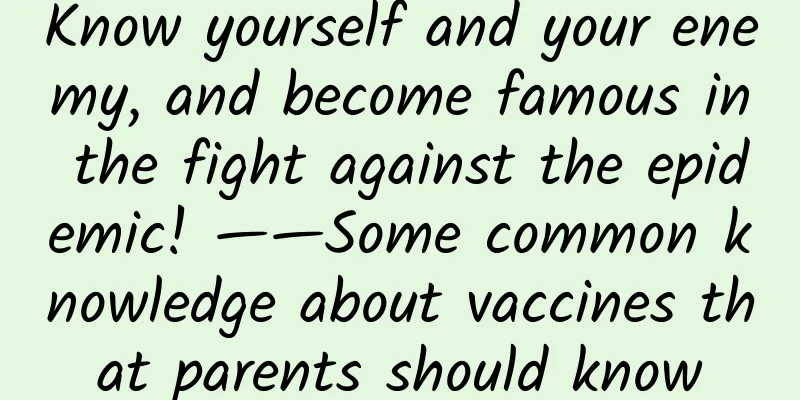Know yourself and your enemy, and become famous in the fight against the epidemic! ——Some common knowledge about vaccines that parents should know

|
Author: Wang Lin, Chief Physician, Children's Hospital, Capital Institute of Pediatrics Vice Chairman of the Children's Health Branch of the Chinese Association of Preventive Medicine Reviewer: Dong Jian, Chief Physician, Zhongshan Hospital, Fudan University Vice Chairman of the Science Popularization Branch of the Chinese Medical Association April 25, 2023 is the 37th "National Children's Vaccination Day" in my country. Figure 1 Original copyright image, no permission to reprint On June 20, 1986, with the approval of the State Council, the Ministry of Health, the State Education Commission, the All-China Women's Federation, the Ministry of Radio, Film and Television, the Ministry of Economics and Trade, and the State Ethnic Affairs Commission jointly issued a notice to establish the National Children's Immunization Coordination Group and set April 25 as the National Children's Vaccination Day. Therefore, April 25 of each year has become the "National Children's Vaccination Day". In October 2000, the World Health Organization's Western Pacific Region was declared a polio-free region, marking that my country has achieved the polio-free goal. This is thanks to a small "sugar pill", the oral attenuated polio vaccine, which has prevented tens of thousands of children from limb disabilities and saved countless families. After the popularization of hepatitis B vaccination for newborns, the hepatitis B virus carrier rate among children under 5 years old in my country dropped from 9.7% in 1992 to 0.3% in 2014. In addition to polio and hepatitis B vaccines, there are many other vaccines that are silently protecting children's health and have been included in the national immunization program. Vaccinating children can prevent many diseases and build a solid barrier for children's health. Let’s talk about vaccination. 1. What vaccines does the baby need to receive routinely after birth? Vaccination is something every baby must go through after birth, and the types of vaccines given at different months or ages are different. 24 hours after birth: BCG vaccination, first dose of hepatitis B vaccine; One month after birth: second dose of hepatitis B vaccine; 2 months after birth: first dose of polio vaccine; 3 months after birth: second dose of polio vaccine and first dose of diphtheria, pertussis and tetanus vaccine; 4 months after birth: 3rd dose of polio vaccine, 2nd dose of diphtheria, pertussis and tetanus vaccine; 5 months after birth: Receive the third dose of DTP vaccine; 6 months after birth: first dose of meningococcal vaccine and third dose of hepatitis B vaccine; 8 months after birth: leprosy vaccine; 9 months after birth: second dose of meningococcal vaccine; 1 year old: first dose of Japanese encephalitis vaccine; 1.5 years old: 4th dose of DTP vaccine, 1st dose of Hepatitis A vaccine, 1st dose of Varicella vaccine, and 1st dose of MMR vaccine; 2 years old: Receive the second dose of Japanese encephalitis vaccine; 3 years old: Vaccine A+C for meningococcal meningitis; 4 years old: Receive the fourth dose of polio vaccine. These are the types, frequency, and time of vaccines that children aged 0-4 years old need to receive. So, what does each vaccine do? From the names of the vaccines, we can roughly know that, for example, BCG vaccine prevents tuberculosis; hepatitis B vaccine prevents hepatitis B; polio vaccine prevents polio; DTP vaccine prevents whooping cough, diphtheria, and tetanus; meningococcal vaccine prevents epidemic meningitis; Japanese encephalitis vaccine prevents Japanese encephalitis; hepatitis A vaccine prevents hepatitis A; and varicella vaccine prevents chickenpox. After the baby is born, vaccinations must be given on time according to the national regulations. 2. What should we pay attention to when vaccinating our baby? What should I pay attention to before vaccination? First, it is best to give your baby a bath 1-2 days before vaccination, because it is recommended not to bathe within 24 hours after vaccination; second, the baby must be healthy and cannot be sick, such as fever, diarrhea, vomiting, etc., and the local skin cannot be damaged or have severe rashes; third, prepare the vaccination certificate and physical examination book. It should be noted that it is not recommended for babies with severe allergies to be vaccinated when they are in a severe allergic state, but the allergies cannot be magnified indefinitely. Parents often ask, if the test results show that their child is allergic to peanuts, can they still get the vaccine? If your baby is only allergic to nuts, peanuts, or certain types of fruits, there is no contraindication to vaccination because the vaccine does not contain these components. What should I pay attention to after vaccination? After the vaccination, you must first be observed in the hospital for half an hour so that the doctor can deal with any abnormal conditions in a timely manner. After returning home, your baby may experience systemic or local adverse reactions. For systemic adverse reactions, such as fever, if the body temperature exceeds 38.5℃, oral antipyretic drugs are required. If the body temperature is below 38.5℃, the child can be given more water, or physical cooling methods can be used to lower the child's temperature. Parents may be worried about whether the child will have a high fever after vaccination. Most of the adverse reactions to vaccines will not last long, nor will the fever be very high. They are generally in a low fever state, so parents should not worry too much. Let the children drink more water, eat a light diet, and observe for 2-3 days, and they will gradually get better. For local adverse reactions, such as redness, swelling, and nodules at the stye site, it is recommended to apply cold compress within 48 hours and hot compress after 48 hours. Parents must pay attention at this time, because children will scratch due to local itching, but the baby's hands are not clean, especially in the hot summer, there may be a lot of bacteria. If the skin is scratched, it will cause local redness, swelling, nodules and aggravate the infection. Once a serious local infection occurs, it will be very difficult to deal with. Therefore, parents should pay special attention and never let their babies scratch. It is best not to expose the pinholes. Wearing longer clothes to cover them can prevent babies from scratching. Figure 2 Original copyright image, no permission to reprint Generally speaking, babies may experience certain degrees of adverse reactions after vaccination. Minor adverse reactions are normal reactions of the body and parents do not need to worry too much. Many parents believe that it is best if there is no reaction after vaccination. In fact, this understanding is incomplete. For a normal individual, a certain reaction after vaccination also means that the vaccination is successful. Of course, if there are some particularly serious adverse reactions, you should still seek medical attention in time to prevent serious consequences. |
>>: Food Science: Technological Innovation from Farm to Table
Recommend
How come my breast fibroids disappeared on their own?
In daily life, female breasts are a critical part...
Pubic lice egg eradication method
Pubic lice is a very terrible disease. It is high...
How long can I breastfeed after taking ceftriaxone during lactation?
Breastfeeding mothers should not take medicines e...
Sleep management during the COVID-19 epidemic prevention and control period
During the critical period of COVID-19 prevention...
Changsha Fourth Hospital reminds: Coagulation system diseases are not limited to hemophilia, but also include these...
1. What is the coagulation system? The coagulatio...
Reduce the number of window openings for ventilation in winter and follow the "Seven Musts" for home cleaning and disinfection
The weather is cold in winter, people open window...
Mashable: Social networks are replacing traditional news media – data infographic
In recent years, since the rise of social network...
Can I abort the first child?
Nowadays, people's sexual concepts have becom...
Is phospholipid DHA better? Eat fish, fish oil or DHA eggs?
I've been getting a lot of questions lately a...
Trends to watch in 2022: AR and VR
Omdia's view: The boundary between AR and VR ...
How do women do anal exercises?
Most women in life suffer from hemorrhoid-type di...
What are the reasons why women feel weak in the waist and knees and feel powerless all over?
Feeling weak and not wanting to move is what many...
Column Five & FlowTown: Online habits of American netizens – data infographic
80% of Americans have the habit of surfing the In...









